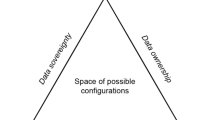Abstract
An approach to the system adjustment of data of various nature used in multidisciplinary research is proposed. These data are characterized by different objective content, designated purpose, and acquisition method. Data adjustment methods were developed and used for the integrated assessment of the effect of an aggregate of threats.
Similar content being viewed by others
References
M. Somervill and D. Rapport, Transdisciplinarity: Recreating Integrated Knowledge, EOLSS Publ. Co. Ltd., Oxford (2000).
S. A. Aivazyan, I. S. Enyukov, and L. D. Meshalkin, Applied Statistics. Analysis of Dependences: A Reference Book [in Russian], Financy i Statistika, Moscow (1985).
M. Z. Zgurovsky, A. A. Boldak, and S. V. Voitko, “An analysis of sustainable development: Global and regional contexts,” Pt. 1 (2010), (www.wdc.org.ua).
A. Newell and H. Simon, Human Problem Solving, Prentice-Hall, Englewood Cliffs (1972).
T. N. Pomerantseva and A. A. Boldak, “Multivariate statistical analysis of the influence of global threats on the security of countries of the world,” Cybern. Syst. Analysis, 46, No. 2, 200–210 (2010).
M. Z. Zgurovsky, A. A. Boldak, and T. N. Pomerantseva, “Analysis of the influence of global threats on the sustainable development of countries and regions of the world using Bayesian belief networks,” Cybern. Syst. Analysis, 46, No. 5, 822–832 (2010).
M. Z. Zgurovsky, “System adjustment of various nature DATA for global modelling of sustainable development,” in: Proc. 22-nd Intern. CODATA Conf., 24–27 Oct., 2010, Cape Town, South Africa (2010).
S. A. Aivazyan, V. M. Bukhshtaber, I. S. Enyukov, et al., Applied Statistics. Classification and Dimension Reduction [in Russian], Financy i Statistika, Moscow (1989).
A. N. Kolmogorov and S. V. Fomin, Elements of the Theory of Functions and Functional Analysis [in Russian], 7th ed., Fizmatlit, Moscow (2004).
A. I. Orlov, Econometrics [in Russian], Ekzamen, Moscow (2004).
N. Balakrishnan, Handbook of the Logistic Distribution, Marcel Dekker, New York (1992).
Yu. M. Lisetskii and N. P. Karevina, “On the automation of expert evaluations,” Mat. Mashiny i Sistemy, No. 1, 151–162 (2008).
L. A. Zadeh, “The concept of a linguistic variable and its application to approximate reasoning,” Information Sciences, 8, No. 3, 199–249 (Part I); 8, No. 4, 301–357 (Part II); 9, No. 1, 43–80 (Part III) (1975).
D. Rutkovskaya, M. Pilinsky, and L. Rutkovsky, Neural Networks, Genetic Algorithms, and Fuzzy Systems [Russian translation], Telecom, Moscow (2004).
W. Trench, Introduction to Real Analysis, Prentice Hall/Pearson Educ., Upper Saddle River (2002).
S. Kullback and R. Leibler, “On information and sufficiency,” Ann. Math. Statist., 22, No. 1, 79–86 (1951).
R. Johnson, “Axiomatic characterization of the directed divergences and their linear combinations,” IEEE Trans. Inform. Theory, IT-25, No. 6, 709–716 (1979).
E. M. Gabidulin and N. I. Pilipchuk, Lectures in the Information Theory [in Russian], MFTI, Moscow (2007).
C. Shannon, Works on the Information Theory and Cybernetics [in Russian], Izd. Inostr. Lit., Moscow (2002).
J. Lin and S. Wong, “Approximation of discrete probability distributions based on a new divergence measure,” Congressus Numerantiitm, 61, 75–80 (1988).
J. Lin, “Divergence measure based on the Shannon entropy,” IEEE Trans. Inform. Theory, 37, No. 1, 145–191 (1991).
M. Z. Zgurovsky, A. A. Boldak, and S. V. Voitko, “An analysis of sustainable development: Global and regional contexts,” Pt. 2 (2010), (www.wdc.org.ua).
I. Z. Batyrshin, Fundamental Operations of Fuzzy Logic and Their Generalization [in Russian], Otechestvo, Kazan (2001).
R. Cignoli, M. D’Ottaviano, and D. Mundici, Algebraic Foundations of Many-Valued Reasoning, Kluwer Acad. Publ., Dordrecht (2000).
E. Klement, R. Mesiar, and E. Pap, Triangular Norms, Springer, New York (2010).
R. Storm, Probability Theory. Mathematical Statistics. Statistical Quality Control [Russian translation], Mir, Moscow (1970).
I. Heinhold and K. W. Gaede, Ingeniur Statistic, Springler-Verlag, München–Wien (1964).
Y. Chou, Statistical Analysis with Business and Economic Applications, Rinehart and Winston, Holt (1975).
Author information
Authors and Affiliations
Corresponding author
Additional information
Translated from Kibernetika i Sistemnyi Analiz, No. 4, pp. 51–64, July–August 2011.
Rights and permissions
About this article
Cite this article
Zgurovsky, M.Z., Boldak, A.A. System adjustment of data of various nature in multidisciplinary research. Cybern Syst Anal 47, 546–556 (2011). https://doi.org/10.1007/s10559-011-9336-0
Received:
Published:
Issue Date:
DOI: https://doi.org/10.1007/s10559-011-9336-0




